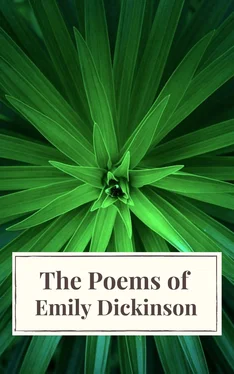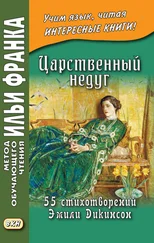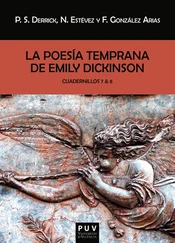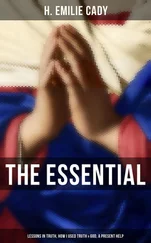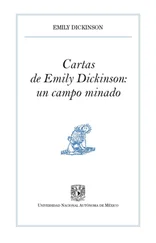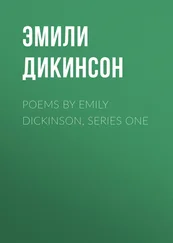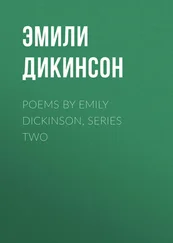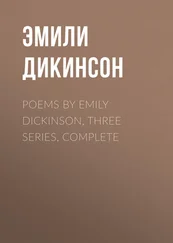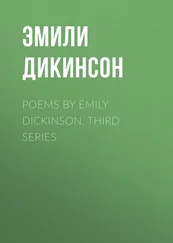A paradise, the host,
And cherubim and seraphim
The most familiar guest.
XVI.
APOCALYPSE.
I'm wife; I've finished that,
That other state;
I'm Czar, I'm woman now:
It's safer so.
How odd the girl's life looks
Behind this soft eclipse!
I think that earth seems so
To those in heaven now.
This being comfort, then
That other kind was pain;
But why compare?
I'm wife! stop there!
XVII.
THE WIFE.
She rose to his requirement, dropped
The playthings of her life
To take the honorable work
Of woman and of wife.
If aught she missed in her new day
Of amplitude, or awe,
Or first prospective, or the gold
In using wore away,
It lay unmentioned, as the sea
Develops pearl and weed,
But only to himself is known
The fathoms they abide.
XVIII.
APOTHEOSIS.
Come slowly, Eden!
Lips unused to thee,
Bashful, sip thy jasmines,
As the fainting bee,
Reaching late his flower,
Round her chamber hums,
Counts his nectars — enters,
And is lost in balms!
III. NATURE.
I.
New feet within my garden go,
New fingers stir the sod;
A troubadour upon the elm
Betrays the solitude.
New children play upon the green,
New weary sleep below;
And still the pensive spring returns,
And still the punctual snow!
II.
MAY-FLOWER.
Pink, small, and punctual,
Aromatic, low,
Covert in April,
Candid in May,
Dear to the moss,
Known by the knoll,
Next to the robin
In every human soul.
Bold little beauty,
Bedecked with thee,
Nature forswears
Antiquity.
III.
WHY?
The murmur of a bee
A witchcraft yieldeth me.
If any ask me why,
'T were easier to die
Than tell.
The red upon the hill
Taketh away my will;
If anybody sneer,
Take care, for God is here,
That's all.
The breaking of the day
Addeth to my degree;
If any ask me how,
Artist, who drew me so,
Must tell!
IV.
Perhaps you'd like to buy a flower?
But I could never sell.
If you would like to borrow
Until the daffodil
Unties her yellow bonnet
Beneath the village door,
Until the bees, from clover rows
Their hock and sherry draw,
Why, I will lend until just then,
But not an hour more!
V.
The pedigree of honey
Does not concern the bee;
A clover, any time, to him
Is aristocracy.
VI.
A SERVICE OF SONG.
Some keep the Sabbath going to church;
I keep it staying at home,
With a bobolink for a chorister,
And an orchard for a dome.
Some keep the Sabbath in surplice;
I just wear my wings,
And instead of tolling the bell for church,
Our little sexton sings.
God preaches, — a noted clergyman, —
And the sermon is never long;
So instead of getting to heaven at last,
I'm going all along!
VII.
The bee is not afraid of me,
I know the butterfly;
The pretty people in the woods
Receive me cordially.
The brooks laugh louder when I come,
The breezes madder play.
Wherefore, mine eyes, thy silver mists?
Wherefore, O summer's day?
VIII.
SUMMER'S ARMIES.
Some rainbow coming from the fair!
Some vision of the world Cashmere
I confidently see!
Or else a peacock's purple train,
Feather by feather, on the plain
Fritters itself away!
The dreamy butterflies bestir,
Lethargic pools resume the whir
Of last year's sundered tune.
From some old fortress on the sun
Baronial bees march, one by one,
In murmuring platoon!
The robins stand as thick to-day
As flakes of snow stood yesterday,
On fence and roof and twig.
The orchis binds her feather on
For her old lover, Don the Sun,
Revisiting the bog!
Without commander, countless, still,
The regiment of wood and hill
In bright detachment stand.
Behold! Whose multitudes are these?
The children of whose turbaned seas,
Or what Circassian land?
IX.
THE GRASS.
The grass so little has to do, —
A sphere of simple green,
With only butterflies to brood,
And bees to entertain,
And stir all day to pretty tunes
The breezes fetch along,
And hold the sunshine in its lap
And bow to everything;
And thread the dews all night, like pearls,
And make itself so fine, —
A duchess were too common
For such a noticing.
And even when it dies, to pass
In odors so divine,
As lowly spices gone to sleep,
Or amulets of pine.
And then to dwell in sovereign barns,
And dream the days away, —
The grass so little has to do,
I wish I were the hay!
X.
A little road not made of man,
Enabled of the eye,
Accessible to thill of bee,
Or cart of butterfly.
If town it have, beyond itself,
'T is that I cannot say;
I only sigh, — no vehicle
Bears me along that way.
XI.
SUMMER SHOWER.
A drop fell on the apple tree,
Another on the roof;
A half a dozen kissed the eaves,
And made the gables laugh.
A few went out to help the brook,
That went to help the sea.
Myself conjectured, Were they pearls,
What necklaces could be!
The dust replaced in hoisted roads,
The birds jocoser sung;
The sunshine threw his hat away,
The orchards spangles hung.
The breezes brought dejected lutes,
And bathed them in the glee;
The East put out a single flag,
And signed the fete away.
XII.
PSALM OF THE DAY.
A something in a summer's day,
As slow her flambeaux burn away,
Which solemnizes me.
A something in a summer's noon, —
An azure depth, a wordless tune,
Transcending ecstasy.
And still within a summer's night
A something so transporting bright,
I clap my hands to see;
Then veil my too inspecting face,
Lest such a subtle, shimmering grace
Flutter too far for me.
The wizard-fingers never rest,
The purple brook within the breast
Still chafes its narrow bed;
Still rears the East her amber flag,
Guides still the sun along the crag
His caravan of red,
Like flowers that heard the tale of dews,
But never deemed the dripping prize
Awaited their low brows;
Or bees, that thought the summer's name
Some rumor of delirium
No summer could for them;
Or Arctic creature, dimly stirred
By tropic hint, — some travelled bird
Imported to the wood;
Or wind's bright signal to the ear,
Making that homely and severe,
Contented, known, before
The heaven unexpected came,
To lives that thought their worshipping
A too presumptuous psalm.
XIII.
THE SEA OF SUNSET.
This is the land the sunset washes,
These are the banks of the Yellow Sea;
Where it rose, or whither it rushes,
These are the western mystery!
Night after night her purple traffic
Strews the landing with opal bales;
Merchantmen poise upon horizons,
Dip, and vanish with fairy sails.
XIV.
PURPLE CLOVER.
There is a flower that bees prefer,
And butterflies desire;
To gain the purple democrat
The humming-birds aspire.
And whatsoever insect pass,
A honey bears away
Proportioned to his several dearth
And her capacity.
Her face is rounder than the moon,
And ruddier than the gown
Of orchis in the pasture,
Or rhododendron worn.
Читать дальше
